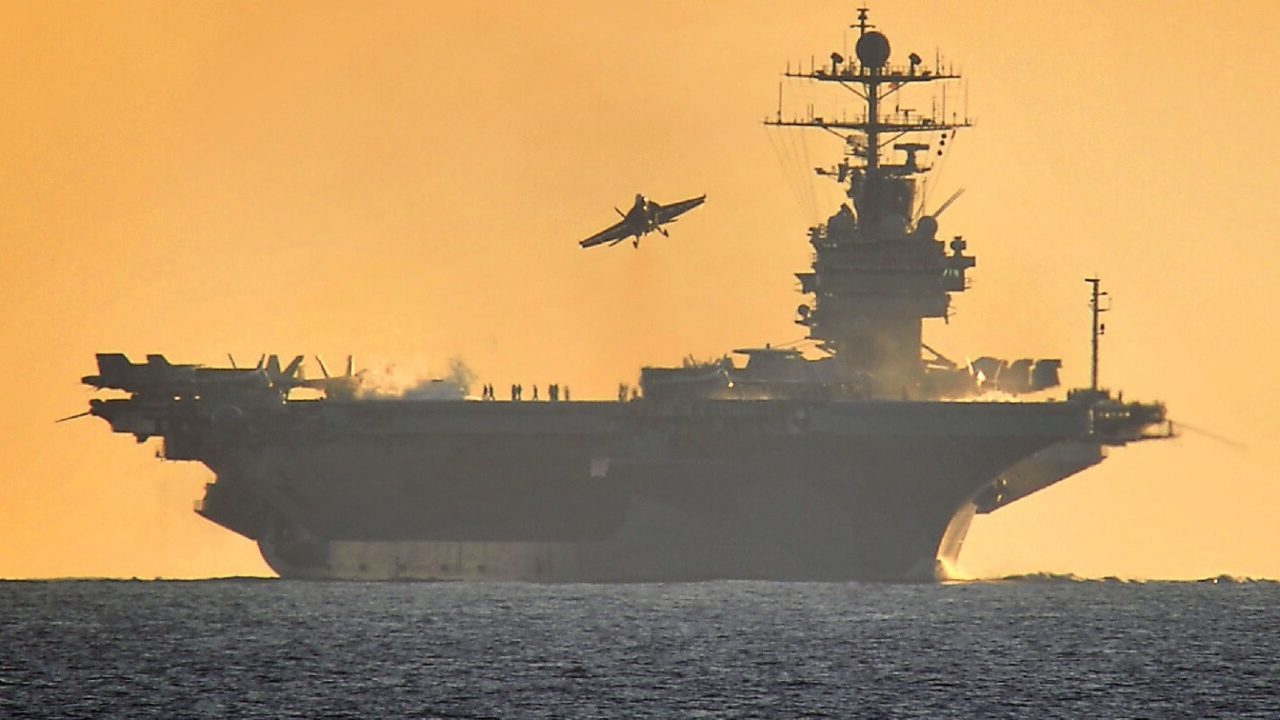An awe-inspiring U.S. attack on the Houthi terrorists in Yemen took place this month, and that caused the militant group to hit back. The terrorists launched 18 ballistic and cruise missiles plus drones on March 16 in response to American strikes the day before.
The Houthi attack was aimed at the USS Harry S. Truman aircraft carrier and its battle group.
So Far, the USS Harry Truman Strike Group Has Not Been Hit by Houthis
The missile duel happened in the northern Red Sea, and more U.S. strikes occurred a few weeks back.
The Houthis had not used munitions against the U.S. Navy since the ceasefire between Hamas and Israel started on January 19.
The Harry S. Truman and its escorts shot down at least 12 attack drones just recently.
The Houthi unmanned craft achieved zero hits.
Numerous Houthis Died During the Attack
The U.S. Navy blasted numerous Houthi military targets in Yemen this month to start the skirmish. At least 53 Houthis died in the initial attack. The strikes were in response to the Houthi’s violence against international shipping.
Trump’s Large-scale Military Mission
This was the most significant military operation during Donald Trump’s presidency. On Monday, “the Red Sea port city of Hodeidah and Al Jawf governorate north of the capital Sanaa were targeted,” according to Al Masirah.
The attacks are expected to continue as Trump promised that the Houthis would pay for their continued threats in the region. The Houthis have rained down fire on civilian shipping targeting 100 maritime ships and killing four sailors since November 2023.
Trump said on Truth Social that the United States would punish the Houthis for an “unrelenting campaign of piracy, violence and terrorism.”
Strategic Area Sees Attacks from Houthis Routinely
The Houthis have targeted shipping in the Red Sea and the Gulf of Aden. This critical region for international trade features cargo vessels transiting through Egypt’s Suez Canal. Significant shipments of oil and consumer goods are sent through these waterways.
Trump has broadened the array and diversity of targets compared to what occurred during the Biden administration.
The Bombing Will Continue
“We’re doing the entire world a favor by getting rid of these guys and their ability to strike global shipping,” U.S. Secretary of State Marco Rubio told CBS News’ Face The Nation on Sunday. “That’s the mission here, and it will continue until that’s carried out.”
Meanwhile, Israel is also responding to Houthi strikes against the Jewish nation. They are striking targets in the port city of Hodeida, too. In retur,n the Houthis said they would hit Israeli ships operating near the country.
The Israelis and Americans could eventually target individual terrorists that lead the group, showing an escalation not seen under Biden.
The Houthis are expected to hit oil infrastructure in Saudi Arabia and the United Arab Emirates with drones and missiles to answer back.
Iran is behind the terrorists and has given them arms support for years. The Houthis are members of the Shiite Zaydi religion.
The Iranians also support Hamas and Hezbollah in what is known as the “Axis of Resistance” against the United States, the West, and Israel.
Tehran has not made any specific threats against the Americans or Israelis, but that could change soon. Iran’s Quds force of the Islamic Revolutionary Guard is believed to be assisting the Houthis in their attacks.
The Iranian government has maintained that the Houthis are making their own decisions about pursuing warfare in the region and that Tehran’s political leadership has no direct control over the Houthis.
The Americans could attack what it believes to be Iranian Quds force commanders on the ground in Yemen, although Washington has not ordered these types of retaliatory strikes against individual terrorists.
Despite the warnings to Iran, the Trump administration is working to forge some form of diplomatic activity with Iran to keep Tehran from developing a nuclear weapon. Trump has delivered a letter to Iran’s Supreme Leader to create talks.
These attacks on Yemen could be an aspect of Trump’s negotiating style that aims to use military strength and deterrence to bring adversaries to the table.
This type of armed diplomacy is playing out in the broader Middle East, and Trump hopes the strikes can tamp down resistance from the terrorist groups that Iran supports.
About the Author: Dr. Brent M. Eastwood
Brent M. Eastwood, PhD is the author of Don’t Turn Your Back On the World: a Conservative Foreign Policy and Humans, Machines, and Data: Future Trends in Warfare plus two other books. Brent was the founder and CEO of a tech firm that predicted world events using artificial intelligence. He served as a legislative fellow for U.S. Senator Tim Scott and advised the senator on defense and foreign policy issues. He has taught at American University, George Washington University, and George Mason University. Brent is a former U.S. Army Infantry officer. He can be followed on X @BMEastwood.

